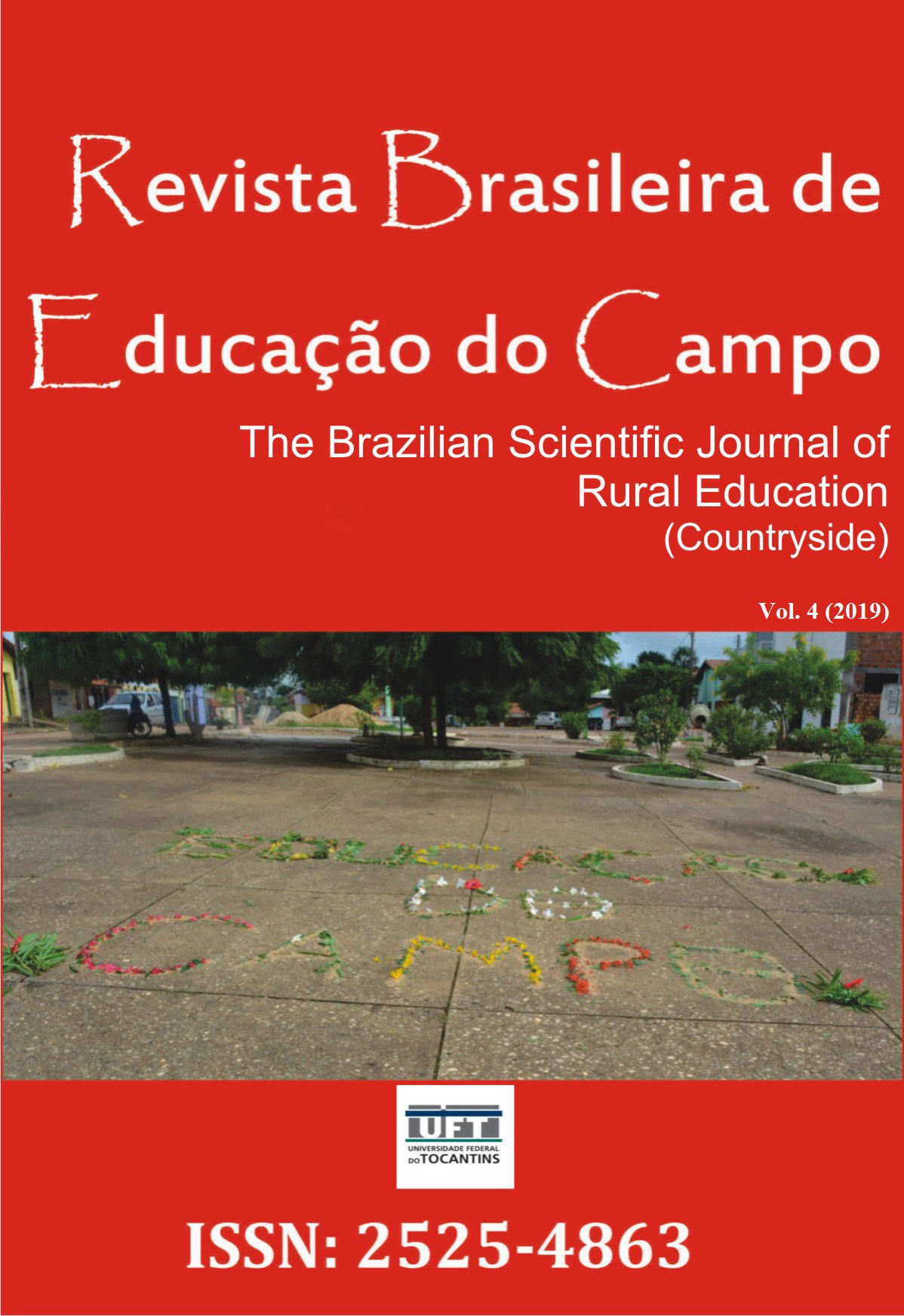The pedagogy of alternation and the construction of the social movement of extractivists in Amapaense Amazon
DOI :
https://doi.org/10.20873/uft.rbec.e7328Résumé
Abstract. This article aims to present partial results of a study conducted in 2017-2018 on extractive social movements in the southern state of Amapá, especially the centrality of the pedagogy of alternation in struggles and construction of the collective identity of these subjects. This is a research based on historical-dialectical materialism as a theoretical, methodological and analytical approach using as an instrument the interview with leaders of the extractive movement and family schools in the region, totaling ten subjects. The main categories of analysis are 'class struggle', 'peasant identity' and 'awareness'. The results of the study show the pedagogy of alternation as a central strategy of rural education and intellectual formation of these protagonists, reconfiguring the meaning of the struggle for the conquest of public policies and social rights. The conclusions explain the trajectory of the extractivists as a social subject with their own identity, social class consciousness built in the struggle for the maintenance of the native forest as a milestone of social identity category. This study contributes to the advancement of the extractivists' collective organization and the publicization of their unprecedented trajectory and identity.
Téléchargements
Références
Bauer, M. W. (2002). Análise de conteúdo clássica: uma revisão. In Bauer, M. W. (Org.). Pesquisa qualitativa com texto, imagem e som: um manual prático (pp. 189-217). Petrópolis, RJ: Vozes.
Caldart, R. S. (2004). Por uma Educação do Campo: Traços de uma Identidade em Construção. In Arroyo, M. (Org.). Por uma Educação do Campo (pp. 18-25). 2. ed. Petrópolis, RJ: Vozes.
Castells, M. (1980). A sociedade em rede. v. 1. São Paulo, SP: Paz e Terra.
Castro, E. G. (2010). Quem faz o campo das políticas públicas de juventude: demandas, bandeiras e questões. Palestra. Ação Educativa.
Costa, H. G. P. (2016). Políticas Públicas de Educação: um estudo sobre os programas federais de educação para o campo no Amapá (Dissertação de Mestrado). Universidade Federal do Amapá, Amapá.
CPT, Comissão Pastoral da Terra. (2010). Histórico. Recuperado de: https://www.cptnacional.org.br/index.php/sobrenos/historico. Acesso em 23 mar. 2017.
Demo, P. (1995). Metodologia científica em Ciências Sociais. São Paulo, SP: Atlas.
Fernandes, B. M. (2009). Campesinato e agronegócio na América Latina: a questão agrária atual. São Paulo, SP: Clacso - Editora Expressão Popular.
Filocreão, A. S. M. (2014). A História do Agroextrativismo na Amazônia Amapaense. Macapá, AP: UNIFAP.
Gimonet, J. C. (2007). Praticar e Compreender a Pedagogia da Alternância no Brasil. Petrópolis, RJ: Vozes.
Gohn. M. G. (2011). Movimentos sociais na contemporaneidade. Revista Brasileira de Educação, 16(47), 333-513. Doi: http://dx.doi.org/10.1590/S1413-24782011000200005
Laville, C., & Dionne, J. (1999). A construção do saber. Belo Horizonte, MG: UFMG.
Marx, K., & Engels, F. (2009). A Ideologia Alemã. São Paulo, SP: Bomtempo.
Minayo, M. C. S. (Org.). (2002). Pesquisa Social: teoria, método e criatividade. 2º Ed. Petrópolis, RJ: Vozes.
Nosella, P. (1977). Uma nova educação para o meio rural. São Paulo, SP: PUC.
Ribeiro, M. (2010). Movimento camponês, trabalho e educação. 1. ed. São Paulo, SP: Expressão Popular.
Santos. M. (1996). A natureza do espaço: técnica e tempo, razão e emoção. São Paulo, SP: Ed Hucitec.
Sousa, R. (Org.). (2016). Educação do Campo na Amazônia. Belém, PA: IEB.
Touraine, A. (1994). Crítica da modernidade. Petrópolis, RJ: Vozes.
Turato, E. R. (2004). A questão da complementaridade e das diferenças entre métodos quantitativos e qualitativos de pesquisa: uma discussão epistemológica necessária. In Grebits, S., & Norteg, S. (Orgs.). Método qualitativo: epistemologia, complementaridade e capôs de aplicação (pp. 17-51). São Paulo, SP: Vetor.
Vieira, L. (1999). Cidadania Global e Estado Nacional. Dados, 42(3), 395-419.
Téléchargements
Publié-e
Comment citer
Numéro
Rubrique
Licence
Proposal for Copyright Notice Creative Commons
1. Policy Proposal to Open Access Journals
Authors who publish with this journal agree to the following terms:
A. Authors retain copyright and grant the journal right of first publication with the work simultaneously licensed under the Creative Commons Attribution License that allows sharing the work with recognition of its initial publication in this journal.
B. Authors are able to take on additional contracts separately, non-exclusive distribution of the version of the paper published in this journal (ex .: publish in institutional repository or as a book), with an acknowledgment of its initial publication in this journal.
C. Authors are permitted and encouraged to post their work online (eg .: in institutional repositories or on their website) at any point before or during the editorial process, as it can lead to productive exchanges, as well as increase the impact and the citation of published work (See the Effect of Open Access).














